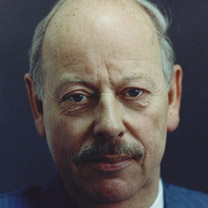Top Qs
Timeline
Chat
Perspective
Pieter Kooijmans
Dutch politician, jurist, and diplomat (1933–2013) From Wikipedia, the free encyclopedia
Remove ads
Pieter Hendrik "Peter" Kooijmans (Dutch pronunciation: [ˈpitər ˈɦɛndrɪk ˈpeːtər ˈkoːimɑns]; 6 July 1933 – 13 February 2013) was a Dutch politician, jurist, and diplomat. He was a member of the defunct Anti-Revolutionary Party (ARP), which later merged into the Christian Democratic Appeal (CDA) party. From 1993 to 1994, he served as Foreign Minister of the Netherlands, succeeding Hans van den Broek. In 1995, he returned to his former position as Professor of Public International Law at the University of Leiden, serving until his appointment to the International Court of Justice. He was granted the honorary title of Minister of State on 13 July 2007.[1]
Remove ads
Early life and education
Pieter Hendrik Kooijmans was born on 6 July 1933 in Heemstede in the Netherlands. His father was Johannes Kooijmans, an engineer and a member of the municipal council of Heemstede, and his mother was Alida Jonker.[2] Kooijmans went to the secondary school Eerste Christelijk Lyceum in Haarlem, where he followed the gymnasium program in humanities.
Kooijmans studied at the Vrije Universiteit Amsterdam from July 1951, majoring in economics and law, obtaining a Bachelor of Economics degree in June 1953 and a Bachelor of Laws degree in July 1954. He then worked as a student researcher before graduating with a Master of Economics degree in June 1957 and a Master of Laws degree in July 1958. Kooijmans worked as a researcher at the VU from July 1958 until January 1962, earning his doctoral degree in international law with his dissertation The doctrine of the legal equality of states; an inquiry into the foundations of international law in 1964.
Remove ads
Academic and political career
Summarize
Perspective
From 1962 to 1965 Kooijmans was lector (associate professor) of international and European law at the VU, and on 26 March 1965 he was appointed full professor of international law, succeeding Gezina van der Molen. In 1976 and again in 1991, he served as a lecturer at The Hague Academy of International Law.
After the election of 1972 Kooijmans was appointed as State Secretary for Foreign Affairs in the Den Uyl cabinet until 19 December 1977. The Cabinet Den Uyl fell on 22 March 1977 after four years of tensions in the coalition and continued to serve in a demissionary capacity. In May 1977 Kooijmans announced that he would not stand for the election of 1977. Following the cabinet formation Kooijmans did not return in the new cabinet.
Kooijmans semi-retired from national politics and served as a professor of international law at Leiden University from 10 January 1978 until 20 December 1992. He also taught international law and international relations at The Hague Academy of International Law from 1 August 1979 until 1 November 1989. Kooijmans also served as United Nations special rapporteur on human rights and torture.
Kooijmans was appointed as minister of foreign affairs in the Third Lubbers cabinet following the appointment of Hans van den Broek as the European Commissioner, taking office on 3 January 1993. In September 1993 Kooijmans announced that he would not stand for the election of 1994. He served as a Judge on the International Court of Justice from 1997 to 2006.[3]
On 5 February 2014, Kooijmans' alma mater, the VU, started the Kooijmans Institute.[4][5]
Remove ads
Decorations
References
External links
Wikiwand - on
Seamless Wikipedia browsing. On steroids.
Remove ads


